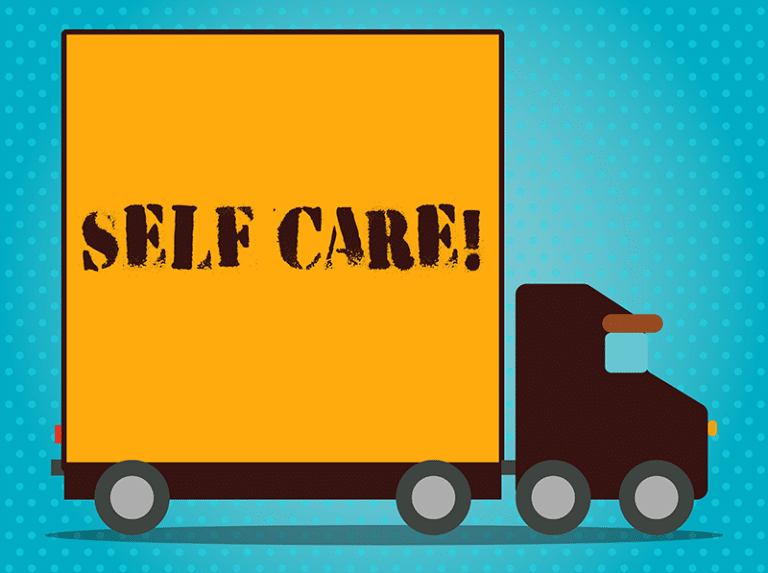A truck driver’s life can be tough, characterized by extended hours behind the wheel and prolonged periods of solitude.
But what can be done to cope with the stress and loneliness that often accompany this profession?
According to a study by the Occupational Safety and Health (OSHA), “Truck drivers were found to be at high risk for a variety of health disorders and particularly for unhealthy lifestyle behaviors, such as physical inactivity and poor diet.”
Many drivers suffer from mental health issues such as depression and anxiety. It’s time to start the conversation about mental health in the trucking industry.
Drivers often feel they have no one to turn to and are left to cope in isolation. However, there are several strategies that can help truckers maintain a healthy mindset while on the road.
The Psychological Challenges of Being a Trucker
The trucking profession not only requires physical endurance but also poses significant mental challenges.
Life on the road can take a psychological toll on truck drivers, and it’s essential to understand the challenges they face such as:
Loneliness and Isolation
One of the most significant issues for truck drivers is loneliness and isolation.
Long hours behind the wheel, away from home and family, can be emotionally taxing. Truck drivers can also struggle to connect with others as they travel from one location to another, and social interactions are often limited.
This loneliness can lead to depression and anxiety, which negatively impact their mental health over time.
Unpredictability
Like any other profession, being a trucker can be stressful.
But for truck drivers, the unpredictability of their schedule can add to that stress, as they often have no say in their route or delivery times.
Weather and traffic conditions can also cause significant delays, leading to added anxiety and frustration.
Physical Demands
Long hours of driving, irregular sleep patterns, and a lack of exercise can also take a toll on a truck driver’s mental health.
Lack of sleep may contribute to feelings of depression and anxiety, while leading a sedentary lifestyle can result in weight gain and a higher likelihood of health issues, further exacerbating stress levels.
Pressure and Responsibility
Truck drivers have a significant responsibility to safely transport goods from one place to another.
This can be immensely stressful, especially when navigating through congested roads, hazardous weather conditions, and strict delivery schedules.
The pressure to perform well and meet deadlines can be demanding, leading to stress and anxiety.
Mental Health and the Trucking Industry
The trucking industry can be a demanding and stressful profession, which can have a significant impact on the mental health of truck drivers.
Long hours on the road, tight deadlines, and isolation can lead to depression, anxiety, and other mental health issues.
Unfortunately, the stigma around mental health in the trucking industry can prevent drivers from seeking help, leading to a lack of support and resources.
Addressing mental health in the trucking industry is crucial for not only the well-being of drivers but also for road safety.
It is essential to raise awareness and provide resources for mental health support within the industry.
Coping Mechanisms for Truckers
Working as a truck driver can be exciting and rewarding, but it can also be stressful and challenging.
Being away from family and friends for long periods of time, dealing with traffic and weather conditions, and living in a confined space can take a toll on a person’s mental health.
Coping mechanisms can help truckers deal with the challenges and stresses of the job.
- Exercise regularly
- Maintain a healthy diet
- Stay connected with loved ones
- Practice mindfulness
- Seek support
Being a truck driver is not an easy job, but with the right coping mechanisms, truckers can manage stress and anxiety and stay healthy on the road.
By exercising regularly, maintaining a healthy diet, staying connected with loved ones, practicing mindfulness, and seeking support, they can overcome the challenges and enjoy the rewards of the job.
Social Support for Truckers
Truckers are an essential component of our economy, transporting goods and supplies from one location to another.
Despite playing a crucial role in our daily lives, truckers often face isolation and mental health challenges due to their long hours on the road.
However, social support can help truckers overcome these challenges and lead fulfilling lives on and off the road.
- Join a trucking community
- Seek professional support
- Join a support group
- Take advantage of employee assistance programs (EAPs)
It’s important for truckers to prioritize their well-being and recognize the value of social support in leading a fulfilling life on and off the road.
How to Prioritize Physical and Mental Health While on the Road
Traveling can be exciting and fulfilling, but it can also be physically and mentally demanding. It’s important to make your health a priority even while on the road.
One way to prioritize physical health is by packing healthy snacks and choosing nutritious meals while dining out.
You can also schedule time for exercise, such as taking a walk or using a hotel gym. To support your mental health, plan downtime for yourself to relax and recharge.
This could be reading a book, meditating, or practicing other self-care habits. Prioritizing your physical and mental health while on the road will result in a more enjoyable and successful trip.
Related: Achieving Work-Life Balance As A Truck Driver
Seeking Professional Help
The trucking industry can be a challenging and demanding industry to work in, with long hours and isolation on the road.
Regrettably, these challenges may negatively impact truck drivers’ mental well-being, leading to feelings of stress, anxiety, and depression.
Seeking professional help for trucking and mental health can be an important step to take to prevent these mental health issues or to manage them effectively.
By working with a mental health professional who understands the unique challenges faced by truckers, individuals in the industry can receive the care and support they need to lead happier, healthier lives both on and off the road.
Promoting Mental Health in the Workplace
Truck driving is a high-stress job that can take a significant toll on mental health. As such, it is crucial to promote mental health in the workplace, even if that workplace happens to be a cab.
Employers can provide resources such as counseling sessions, stress management workshops, and literature about mental health. In addition, encouraging truckers to take breaks and prioritize self-care can go a long way in promoting their overall well-being on the road.
By prioritizing mental health in the workplace, truckers can improve their quality of life and performance while also reducing the risk of burnout and other mental health challenges.
Prioritize Your Mental Health
Taking baby steps is the key to start prioritizing your mental health. To know more about how to handle life as a truck driver, take a look at our Canal Cartage blogs.



